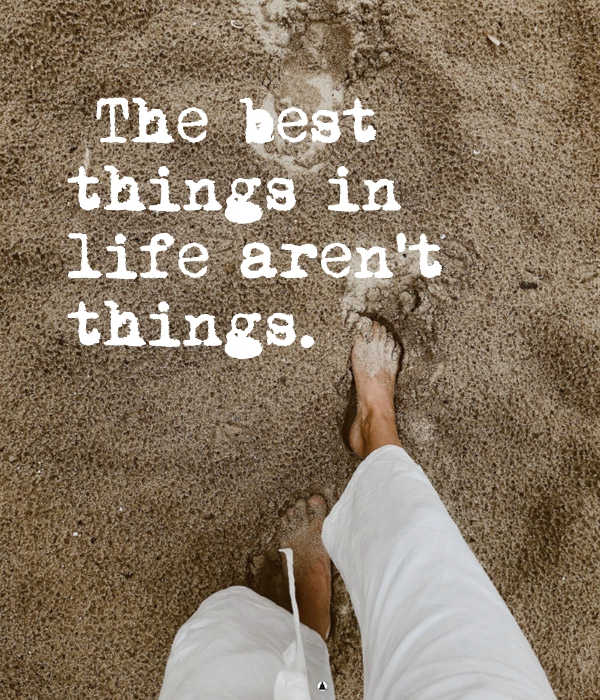Join Our Newsletter
Subscribe with your email to receive the latest news, updates, and exclusive offers.

Here’s the reality.
We spend our lives working hard so that we can afford to have the life that we always dreamed of. We educate ourselves, we take additional courses, we work our assess off to find a nice, well-paid, prosperous job. At the end of the day, we do all of it just so we can spend our hard-earned money on things that make us happy.
Naturally, as human beings who have pretty much different tastes, preferences, opinions, and desires, we tend to seek pleasure in different things. Some people enjoy diving in the material world, and some are in constant pursuit of thrilling and life-changing adventures.
But, if you ask an average person whether they would rather buy the new iPhone x than book a trip to a new and exciting destination, they would probably choose the first option.
Why? Well, because we live in a greedy, materialist society. Strangely it is somehow more important for some to be equipped with the latest tech-gadgets than to actually explore everything this life has to offer.
Now, if you ask me, I wouldn’t wait a minute before I dive in the world of never-ending adventures and exciting experiences.
And this is why I strongly recommend you do the same.
Dr. Thomas Gilovich, a renowned psychology professor at Cornell University was very determined to prove that experiences matter more than material things. So, he conducted a 20-year study which analyzed how object purchasing and having new, exciting experiences affected people.
According to him, there are three reasons as to why the thrill from object-purchasing is usually short-term:
First and foremost, the thrill of buying something new is gone very soon after we purchase the product. We’re quickly getting used to new possessions. “The trouble with things,” he says, “is that the happiness they provide fades quickly.”
Second, as human beings, we’re never fully satisfied with anything. The more we own, the more we want. We are always on the lookout for the next best thing.
And last but not least, we looove to compare ourselves to the people around us. The joy of buying a new car lasts until our friend buys a better one. Keeping up with the Joneses is what we must always do.
Gilovich explains that “One of the enemies of happiness is adaptation. We buy things to make us happy, and we succeed. But only for a while. New things are exciting to us at first, but then we adapt to them.”
We believe that the more we own, the happier we’ll be. The paradox of possessing something material is that we actually think that this object will make us happy as long as it exists. But, in reality, the value of objects is fleeting. We are constantly faced with new, improved and advanced substitutes for the things we own. And we often struggle to resist that temptation. As а result, our possessions lose their glow. And we lose our interest.

Experiences, on the other hand, may last shorter, but they are stuck with us. They change our perspective and shape our characters. They open our eyes, help us gain new knowledge and broaden our horizons. They become a part of who we are. And eventually, they deliver us more happiness than material possessions.
“You can really like your material stuff. You can even think that part of your identity is connected to those things, but nonetheless, they remain separate from you. In contrast, your experiences really are part of you. We are the sum total of our experiences.” says Gilovich.
It doesn’t matter if it’s a trip around the world, a new language lesson, a sports activity, a photography course, an amazing night at the opera or the theater, a hiking tour, a sky-diving adventure or anything else, the impression these experiences leave on us lasts forever.
They occur a few times in life (some of them even once an in a lifetime), but their memories mark us for life. They become special parts of our lives. Events that helped us break out from our boring routines and touched us deeper than everything else.
Still, the question remains. “What if I am not happy with the outcome?”
The truth is the list of ‘what if’s’ can be long. And that, in my opinion, is completely normal. There might be a million reasons in your head why you wouldn’t want to try something new.
However, luckily for all of us, science has given us the thumb and has confirmed that when it comes to experiences, it is always worth taking the risk. Because even if something doesn’t turn out according to the plan, in the end, you will always have those precious memories to go back to.
Even the greatest disaster has some positive sides. But, only if you want to see them.
So, what makes you happy? Are you interested in adventures or you like to spend your money on things?
We’d love to hear your opinion on this subject. Feel free to share your thoughts in the comments section below.
